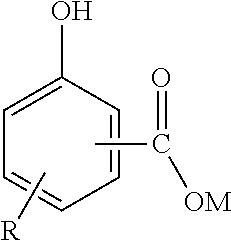Marine engine lubrication
a technology for marine engines and lubrication, which is applied in the direction of machines/engines, mechanical equipment, fuels, etc., can solve the problems of crankcase explosion, crack formation and propagation through the piston, etc., and achieve the effect of improving the control of asphaltene precipitation and deposition, and boosting the performance of detergent additives
- Summary
- Abstract
- Description
- Claims
- Application Information
AI Technical Summary
Benefits of technology
Problems solved by technology
Method used
Image
Examples
examples
Components
[0096]The following compounds were used:
Oil of Lubricating Viscosity
[0097]An API Group II 600R basestock from Chevron[0098](A) Detergents (1) a 225BN Ca alkyl salicylate (alkyl=C14-18)[0099](2) a 350BN Ca alkyl salicylate (alkyl=C14-18)[0100](B) A set of polyisobutene succinic anhydrides (“PIBSA”) derived from a polyisobutene and made by a chloro-(Diels-Alder) process. The properties of each PIBSA are shown in the table in the RESULTS section below.[0101](C) A zinc dihydrocarbyl dithiophosphate at 0.5%.
Heavy Fuel Oil 1S0-F-RMG 380
Lubricants
[0102]Selections of the above components were blended with the oil of lubricating viscosity to give a range of trunk piston marine engine lubricants. Some of the lubricants were examples of the invention; others were reference examples for comparison purposes. Each lubricant contained the same combination of detergents in (A) to give a lubricating oil with a TBN of 40 mgKOH / g and a different PIBSA at a treat rate of 2-6 mass %.
Testing
Lig...
PUM
 Login to View More
Login to View More Abstract
Description
Claims
Application Information
 Login to View More
Login to View More - R&D
- Intellectual Property
- Life Sciences
- Materials
- Tech Scout
- Unparalleled Data Quality
- Higher Quality Content
- 60% Fewer Hallucinations
Browse by: Latest US Patents, China's latest patents, Technical Efficacy Thesaurus, Application Domain, Technology Topic, Popular Technical Reports.
© 2025 PatSnap. All rights reserved.Legal|Privacy policy|Modern Slavery Act Transparency Statement|Sitemap|About US| Contact US: help@patsnap.com

